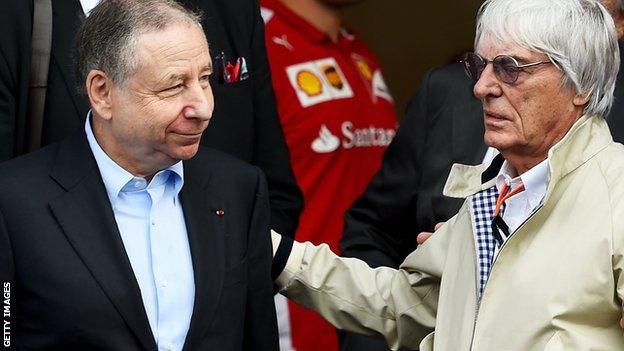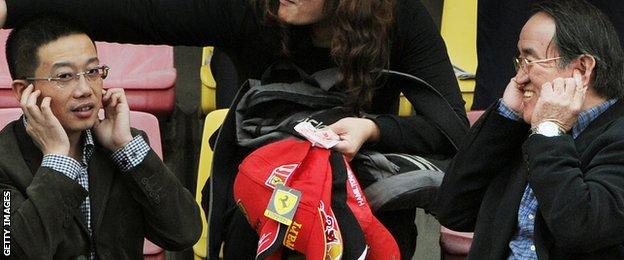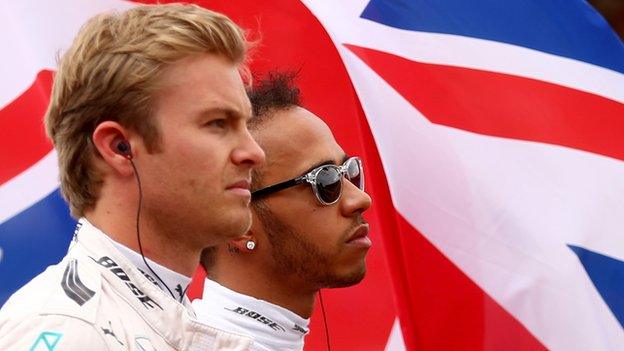Cheaper engine alternative rejected by Formula 1 bosses
- Published

Jean Todt and Bernie Ecclestone had backed the proposal
Formula 1 bosses have rejected plans to introduce a cheaper, alternative engine alongside the turbo hybrids used since 2014.
The proposal was backed by commercial boss Bernie Ecclestone and Jean Todt, president of governing body the FIA.
But a meeting of the F1 Commission on Tuesday voted "not to pursue" the idea, an FIA statement said.
Engine manufacturers agreed instead to address concerns about the cost, supply and complication of existing engines.
A statement issued following the meeting of the F1 Commission - which includes representatives of the teams, engine builders, circuits and sponsors, as well as Todt and Ecclestone - said "the parties involved have agreed on a course to address several key areas relating to power-unit supply in F1".
These are:
a guarantee of supply to teams
the need to reduce the engines' cost
simplification of the specification
"improved noise"
The statement said the manufacturers would "present a proposal by 15 January 2016 that will seek to provide solutions to the above concerns".
The vote represents a victory for Mercedes and Ferrari in a power struggle with Todt and, particularly, Ecclestone, who has grown frustrated with the companies' influence in F1 and his own impotence to introduce change.
Todt and Ecclestone had championed the plan for the alternative engine for different reasons.
Todt was using it as leverage to get the manufacturers to reduce the costs of the engines manufacturers sell to customer teams.

Key issues to be addressed in January proposals include 'engine noise'
Ecclestone was trying to create a situation that reduced the power of Mercedes and Ferrari and increased his own.
The FIA said it had received "four credible expressions of interest" from potential suppliers of the engine.
But Mercedes F1 boss Toto Wolff was among those who had argued that the plan, which included an 'equivalency formula' aimed at allowing the two types of engine to compete against each other fairly, could "never work".
Tuesday's agreement by the F1 Commission follows concerns about the current engines which have led to two politically intense years since their introduction.
Many parties agree that the turbo hybrids are important for F1 as they mirror trends in road-car development and are key to keeping manufacturers interested in competing in the sport.
However, the smaller teams have complained that they are too expensive, Mercedes' domination of F1 has caused unease and Red Bull's struggles to find an engine for 2016 have focused concerns on the fact that the rules do not force manufacturers to supply other teams.
Red Bull has a contract with Renault for 2016, but it sought to end this after the breakdown of relations between the two parties as a result of Red Bull's dissatisfaction with the engine's uncompetitiveness.
But after being rejected by Mercedes, and being told Ferrari did not have the resources to supply the latest-specification engine next year, Red Bull look forced to continue their relationship with the French company.
An approach to Honda was ruled out after Ron Dennis, chief executive of the Japanese company's partner McLaren, exercised his contractual right to veto a second supply.
The increase in cost of the turbo hybrids compared to the 2.4-litre naturally aspirated V8s that were used until 2013 varies.
Costs of the V8s, including a basic energy-recovery package, ranged from about 12-15m euros (£8.5-10.6m), while the turbo hybrids cost in the region of 18-23m euros (£12.7-16.3m).
- Published24 November 2015
- Published24 November 2015

- Published18 November 2015

- Published15 November 2015

- Published18 December 2015

- Published2 November 2018

- Published26 February 2019
